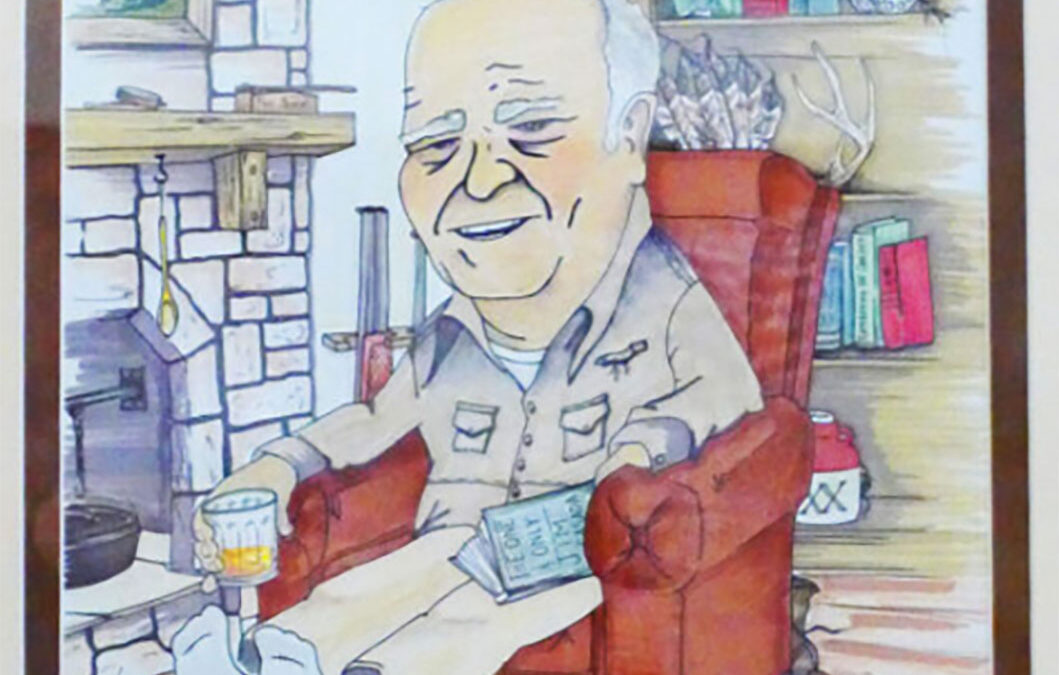The aftermath of the most unfortunate chain of events connected with Mollygrubs’ misfortunes at the Junior Conservation Banquet reverberated through the town of Stony Lonesome for weeks. The hapless lad was harangued unmercifully by his male companions while Mitzi Merkle, once quite happy to flaunt her attributes before the eyes of all and sundry, walked about with downcast eyes and a seemingly permanent blush. Yet their adolescent misery paled in comparison with the state of affairs in the Messer household.
Overnight Mollygrubs’ mother, “Caring Karen” Messer, had been tumbled from her place atop the ranks of the town’s matriarchy into seemingly endless doom and gloom. She developed what, if one listened to the analysis offered by the cadre of codgers holding court daily at Dead Pecker Corner, a permanent case of vapors. Neither Mollygrubs or his sire could do anything right, and mere mention of the name Merkel or the Junior Conservation Banquet was sufficient to plunge her into a fit of racking sobs and send her straight to the refuges afforded by her bedroom. Mr. Messer was relegated to nighttime residence in the guest bedroom and both he and his son soon discovered that the best course for daily living was to avoid the sole female presence in the household with all the assiduity of a wild turkey avoiding a bobcat. Not surprisingly, her domineering absence from the scene, no matter its negative impact on provision of daily meals and myriad other household chores, brought father and son much closer to one another.
Once fall rolled around, they had the opportunity to do some squirrel hunting together on weekends, went on a father-son camping trip, and in general enjoyed one another’s company. It was this new closeness, made possible by the retreat from the scene by the distaff side of the Messer family, that led Mollygrubs’ father to buy him a new Duxbak hunting cap.
It was an era, long before the advent of camouflage patterns, when Duxbak attire was just the ticket for the average hunter. Anything produced by the company — hats and caps in various configurations, vests, jackets with capacious game pouches, pants, and more — lasted pretty much forever. The fabric was stiff canvas, fully capable of “galding” the inside of tender thighs to the point of making anyone wearing Duxbak pants walk in a stance so bow-legged he couldn’t have hemmed a hog in a ditch. Duxbak scoffed at briers and was so durable that in families with more than one boy, attire was handed down with no repair other than some possible attention to frayed pants’ bottoms being necessary.
Mollygrubs was passing proud of his new topper and wore it to school every day. That was a time when caps were worn only outdoors, with no exceptions, but he carried it around in the school building and immediately donned the stiff brown canvas cap, replete with fold-down sides, when he went outdoors. In his own eyes he was the epitome of sartorial splendor on the local scene, and truth be told, classmates who usually filled his life with misery were secretly envious of his cap.
The Biblical book of Proverbs reminds us that “pride goeth before a fall,” and Mollygrubs was soon to learn something of the truth inherent in that precept. He may not have fallen, but he had the dickens frailed out of his somewhat ample posterior.
In those days in Stony Lonesome schools, corporal punishment not only existed; there were applications thereof whenever needed. One teacher who staunchly adhered to the adage suggesting that sparing the rod could quite likely spoil the child was Mollygrubs English teacher at Stony Lonesome High School. That erstwhile pedagogue, one Thad DeHart, was an extraordinary presence in the classroom. At the outset of the year he handed students a mimeographed list, running to several pages, of what he described as “ten-dollar words.” With rare exceptions they were completely unknown to those under his tutelage. By year’s end students were expected to learn the meaning of the words, know how to spell them and use them in a sentence, and extra credit could be garnered by citing an example of where the word was used in a magazine or book. The latter, of course, encouraged students to read for pleasure as well as classroom profit.
While Mollygrubs enjoyed the class and thought far more of the Mr. DeHart than he did most of the drudges holding court in Stony Lonesome High School, he also seemed constitutionally unable to stay out of trouble. A bright lad, he was easily bored by the tedium of daily lessons and also, thanks to being rather gifted intellectually, picked up what was being taught far more rapidly than many of his peers. Moreover, he had a distinct inclination to seek attention. Other teachers tolerated his frequent misdemeanors with varying degrees of resignation, but not Thad DeHart.
That academic worthy kept a barber’s razor strop handy in the cloak room at the back of the class, and on occasions when circumstances merited, he would employ that instrument in delivering what he described as “six of his best.” Mollygrubs had previously experienced a dose of half a dozen solid licks and knew they were quite painful. But when the day arrived for another application of that particular cure for misbehavior, he had a spark of inspiration that proved about as ill-fated as the time when he told Mitzi Merkle the next song they heard would be theirs and it turned out to be “Dead Skunk in the Middle of the Road.”
Thad DeHart, exasperated with Mollygrubs motor mouth interrupting on a seemingly constant basis, reached his breaking point. He told Mollygrubs to go up to his desk and bend over while he retrieved the razor strop. As soon as he was out of sight, the boy grabbed his Duxbak cap and hastily stuffed it in the seat of his pants. His reasoning was simply — the thick, stiff canvas should work wonders in easing the brunt of the coming blows. Instead, the cap had the opposite effect.
Maybe it was the sniggering of his fellow students that alerted Thad DeHart that something was amiss. Or maybe the hasty positioning of the cap left tell-tale bulges that he detected. Whatever the case, all of Mollygrubs’ classmates witnessed an epic delivery of six blows (all watched corporal punishment in Thad Dehart’s class; he told them it was pour encourager les autres) His thinking was that the meaning and origin of the phrase offered a bit of history, worked a bit of foreign lingo into their vocabulary, and did serve as an example of what happened if they went astray. On this occasion, having detected the presence of extra padding, Thad DeHart laid into hapless Mollygrubs with a will that employed all of his sinewy strength while his classmates watch in anguished awe.
It was all Mollygrubs could do not to cry, and for several days afterward he exhibited a great deal of delicate care whenever taking a seat. He never said a word to his parents about the episode, because had his mother seen his black-and-blue bottom she would have gone into hysterics while his father, a member of the local school board, would have waited until his buttocks were better and then given him another solid dose of corrective medicine.
From that point forth, although he continued to like and even take pride in his Duxbak cap, Mollygrubs never viewed it with quite the same degree of affection. It carried with it too many painful memories. Also, he never again evoked the ire of Thad Dehart. Administration of what was truly six of his best worked behavioral wonders.
 Every recipe in the book was, as the subtitle suggests, prepared and tested in our kitchen or on our grill. This isn’t any fancy-dancy book. Rather, it’s a cookbook for the Average Joe hunter, one who appreciates the wonders properly prepared venison can offer. Many of the recipes are the essence of simplicity although some, especially in the “Fancy Fixings” chapter, are more complicated. None require special utensils or culinary knowledge. Buy Now
Every recipe in the book was, as the subtitle suggests, prepared and tested in our kitchen or on our grill. This isn’t any fancy-dancy book. Rather, it’s a cookbook for the Average Joe hunter, one who appreciates the wonders properly prepared venison can offer. Many of the recipes are the essence of simplicity although some, especially in the “Fancy Fixings” chapter, are more complicated. None require special utensils or culinary knowledge. Buy Now


